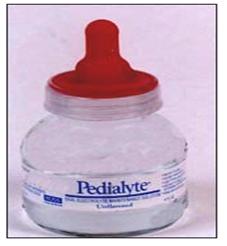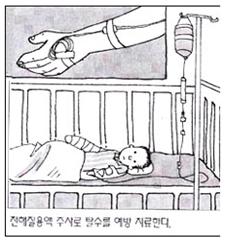신생아기 이후 소아 열, Dehydration fever in the child after neonatal period
신생아기 이후 소아 원인
- 영유아를 두꺼운 담요나 이불 등으로 너무 많이 덮어 주거나 싸줄 때
- 뜨거운 난로 가에 있을 때
- 무더운 여름철에 창문을 꼭 닫은 실내에 오랫동안 있을 때
- 무더운 날씨에 밀폐된 승용차 속에 오랫동안 있을 때
- 뜨거운 햇볕을 오랫동안 쐴 때
- 그 외 다른 이유로 탈수 열이 신생아기 이후 영유아들이나 학령기 아이들에게 날 수 있다
증상 징후
- 감염병이나 다른 기질적 병이 없는데 탈수로 나는 열을 탈수 열이라 한다.
- 탈수 열이 시작된 후 탈수 열 자체로 인해 더 탈수될 수 있다.
- 탈수 열이 섭씨 41~42도 날 수 있다.
- 영유아나 학령기 아이가 탈수되고 고열이 나면 갈증, 정신 불안, 피부 건조 등이 나타날 수 있다.
- 탈수 열이 심할 때는 전신 경련을 할 수 있다.
진단
병력 증상 징후 진찰소견, 임상검사로 진단한다.
치료
- 다른 여러 가지의 원인으로 탈수될 수 있고 고열이 날 수 있다.
- 탈수 열이 나면서 고열이 나면서 앓는 감염병과 탈수 열을 감별진단을 해야 한다.
- 탈수로 고열이 났다고 의심되면 단골 소아청소년과 의사의 도움을 받기 전에 우선 환아를 시원한 곳으로 옮기고 많이 덮어 준 담요는 걷고 얇은 이물을 덮는다. 너무 덥게 입은 옷 등을 벗겨 시원하게 한다.
- 가능한 한 시원한 식수를 충분히 섭취하고 타이레놀(Tylenol)등 해열제로 해열시킨다.
- 찬물이나 얼음물로 목욕 시키면 열이 갑자기 떨어질 수 있고 경련할 수 있다.
- 체온과 동등한 온도의 물로 목욕시켜 해열시킬 수 있다.
- 감염병으로 열이 나는지 알아본다.

사진 115. 페디아라이트(Pedialyte, Ross 회사) 등 경구용 포도당 전해질 용액으로 탈수를 가수화 치료할 때도 있다. Copyright ⓒ 2013 John Sangwon Lee, MD., FAAP

그림 116. 정맥 혈관용 포도당 전해질 용액으로 급성 탈수를 가수화 치료할 수 있다.Copyright ⓒ 2013 John Sangwon Lee, MD., FAAP
Dehydration fever in the child after the neonatal period
신생아기 이후 소아 열
- Children’s causes after neonatal
- When covering or wrapping an infant or toddler too much with a thick blanket or blanket when your child on the side of a hot stove
- When staying in a room with windows tightly closed during the hot summer months When your child is in a closed car in hot weather for a long time
- When you have been in the hot sun for a long time
- For other reasons, dehydration fever can spread to infants and toddlers after neonatal or school-age children.
Symptoms, signs
- There are no infectious diseases or other organic diseases, but the fever caused by dehydration is called dehydration fever.
- After the dehydration heat starts, it may be further dehydrated due to the dehydration heat itself.
- Dehydration fever can be between 41 and 42 degrees Celsius.
- Infants and school-age children who are dehydrated and have a high fever can lead to thirst, mental anxiety, and dry skin.
- Severe dehydration fever can cause systemic convulsions.
Diagnosis
- Medical history, symptoms, symptoms, examination findings, and clinical examination.
Treatment
- There are many other causes that can lead to dehydration and high fever.
- Infectious diseases and dehydration fever should be differentially diagnosed with dehydration fever and high fever.
- If you are suspected of having a high fever due to dehydration, first move the child to a cool place, take off a blanket, and cover a thin foreign body before seeking the help of a regular pediatrician.
- Take off clothes that are too hot to cool.
- Drink plenty of cool drinking water as much as possible and with antipyretic drugs such as Tylenol.
- Bathing in cold or ice water can cause a sudden drop in heat and convulsions.
- Your child can get rid of fever by bathing in water at a temperature equal to your body temperature.
- Find out if your child has a fever from an infectious disease.

Photo 115. Sometimes hydrolysis treatment of dehydration is
performed with oral glucose electrolyte solutions such as Pedialyte
(Ross company). Copyright ⓒ 2013 John Sangwon Lee, MD., FAAP

- Figure 116. Hydrolyzed treatment of acute dehydration with a glucose electrolyte solution for venous blood vessels. Copyright ⓒ 2013 John Sangwon Lee, MD., FAAP
출처 및 참조 문헌 Sources and references
- NelsonTextbook of Pediatrics 22ND Ed
- The Harriet Lane Handbook 22ND Ed
- Growth and development of the children
- Red Book 32nd Ed 2021-2024
- Neonatal Resuscitation, American Academy Pediatrics
Emergency Medical Service for Children, By Ross Lab. May 1989. p.10
Emergency care, Harvey grant, and Robert Murray
Emergency Care Transportation of Sick and Injured American Academy of Orthopaedic Surgeons
Emergency Pediatrics A Guide to Ambulatory Care, Roger M. Barkin, Peter Rosen
Quick Reference To Pediatric Emergencies, Delmer J. Pascoe, M.D., Moses Grossman, M.D. with 26 contributors
Manual of Emergency Care 응급환자관리 정담미디어
소아가정간호백과-부모도 반의사가 되어야 한다, 이상원 저
The pregnancy Bible. By Joan stone, MD. Keith Eddleman, MD
Preparation for Birth. Beverly Savage and Dianna Smith
임신에서 신생아 돌보기까지. 이상원
Breastfeeding. by Ruth Lawrence and Robert Lawrence
Nelson Textbook of Pediatrics 14th ed. Beherman,
The Johns Hopkins Hospital, The Harriet Lane Handbook, 18th edition
Red book 29th-31st edition 2021
Nelson Text Book of Pediatrics 19th-21st Edition
Infectious disease of children, Saul Krugman, Samuel L Katz, Ann A. Gershon, Catherine Wilfert
The Harriet Lane Handbook 19th Edition
Growth and Development of Children, George H. Lowrey 8th edition
소아과학 대한교과서
제1권 소아청소년 응급의료 참조문헌과 출처
Other
Copyright ⓒ 2014 John Sangwon Lee, MD., FAAP
“부모도 반의사가 되어야 한다”-내용은 여러분들의 의사로부터 얻은 정보와 진료를 대신할 수 없습니다.
“The information contained in this publication should not be used as a substitute for the medical care and advice of your doctor. There may be variations in treatment that your doctor may recommend based on individual facts and circumstances.